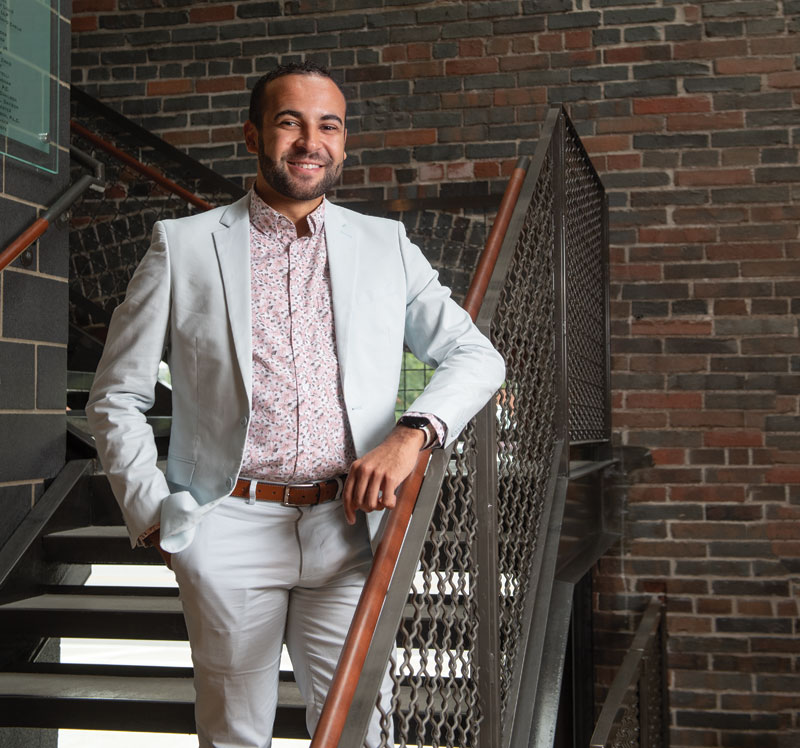How younger employees are approaching leadership at work
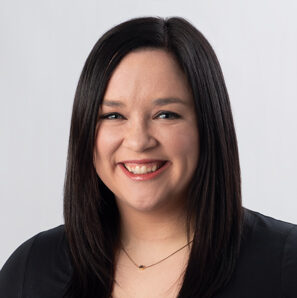
Macey Shofroth Jul 25, 2025 | 6:00 am
16 min read time
3,774 wordsAll Latest News, HR and Leadership, Workforce DevelopmentAccording to the Alliance for Lifetime Income, more than 4.1 million Americans will hit the retirement age of 65 through the year 2027. That’s over 11,200 people every day.
The trend is more pronounced in Iowa, which has the second-highest share of workers aged 65 and older.
As more of those employees exit the workforce in Des Moines, a younger generation is moving into leadership positions and changing the landscape of the business community.
We sat down with four of those leaders to discuss their personal leadership philosophies and how they hope to make an impact in Des Moines.
Responses have been lightly edited for clarity and brevity.
Malycki Mañon-Sosa, director of diversity, equity and inclusion, Iowa State Bar Association
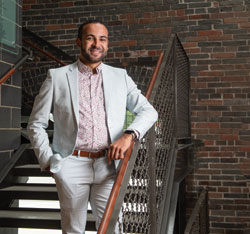
Malycki Mañon-Sosa grew up in Calamus, a town of about 350 people in eastern Iowa. His experiences as one of only a few people of color in his school informed his dedication to making Iowa a welcoming place to people from all walks of life.
“I really had a passion or understanding that Iowa will always be my home. So from a very early age, I’ve always been really dedicated to advocating for those who maybe aren’t the majority population in Iowa,” Mañon-Sosa said.
Since 2023, he’s served as the director of diversity, equity and inclusion for the Iowa State Bar Association. He sees his position of leadership as an opportunity to recruit and retain a diverse group of attorneys in Iowa, particularly from the younger generation, to ensure the legal profession in Iowa is able to continue serving its citizens’ needs.
How would you describe your personal philosophy around leadership?
For me, to be a good leader is also, at the end of the day, to be a good follower. To believe that just because you’re a leader or you have a title with director in it does not mean that you are the subject matter expert in everything under the sun. While I’m the director of DEI, I’m a strong believer in the phrase “nothing about us, without us.” I would never want to speak to someone’s experience without having experienced it firsthand myself. My experience as either an LGBTQ individual or a person of color is starkly different than anyone else that might be a part of my communities. The more voices or seats at the table, the better representation. For me, leadership is less about speaking into a microphone. My job is to stand on the soapbox and amplify voices rather than amplify my own.
I learn so much more from the negative feedback around DEI that our members provide us than I do someone who has always been passionate about it. To me, that’s a good leader. A good leader takes that critical, and sometimes unconstructive, feedback and then it’s what we do with that hurt and feedback that leads us to the good change.
How do you see your and your peers’ philosophies around leadership differing from past generations of leaders?
The Iowa State Bar Association has an incredible staff. We also have a very diverse staff in terms of race, ethnicity and sexual orientation. I think the most important is our intergenerational diversity. To me, the difference that our younger generation has is more people-oriented or more empathetic, and to be people-forward in a sense that we’re willing to talk about what’s happening outside of the workplace and why it’s impacting me inside of the workplace. The older generation sticks to their willingness to sacrifice that work-life balance. There is no one harder-working than my executive director, Harry Shipley. He probably works more hours than there are in a work week, and he impresses me in that. On the flip side of that, it’s my job as a young leader and also in my role to say, ‘We’re tired. Not just me, not just you. We, as a team, are tired.’ I think that’s the difference in our leadership as we’re talking intergenerationally. We have an older generation who has been willing to sacrifice that to achieve success, and we have a younger generation saying, ‘I can still achieve success, and in fact, I’m worthy of the success and achievements and opportunity that you had. But I’m not willing to sacrifice my home life, my kids, my wife, my significant other, my husband, whatever it might be because at the end of the day, if I’m not pouring into those things, how do you expect me to pour into this place?’
How can this new generation of young leaders pave the way for an even younger generation behind them?
I’ve been talking about brain drain in all of my professions and I think intergenerational differences are what we need to be looking at. An older generation needs to realize that they’re living in a new world, but on the flip side, a younger generation needs to realize that our older generation has a lot of value and knowledge that we need to be tapping into. Instead of becoming an us versus them thing, now more than ever, we need to be collaborating. Our older leaders can give us that kind of mentorship on how to also be a great mentor and leader. The COVID-19 pandemic impacted us the way that it did socially, and I think we lack those social skills a bit. I think that is going to be vital in how we pass that on to the next generation or those working under us, because we maybe lack that ability to be vulnerable or that sense of commitment to something greater. That’s how we pass that on, making sure that we can continue to be vulnerable and honest and transparent with one another. To be candid and vulnerable is how we communicate most effectively.
As a young person, how do you build your own voice in these spaces?
I lean a lot on my colleagues. I love the work that I do here, and I love it because of my colleagues, and specifically our young lawyers division who share some of my ideology. But also understanding that there are colleagues of different generations that agree with some of the things I have to say and share. I build my resiliency there and that helps me feel competent in going to my boss or our leaders and saying, ‘This is what I need from you. And I need this from you, because there’s no other place I’d rather be.’”
Rocio Hermosillo, co-founder and CEO, Team ELLLA
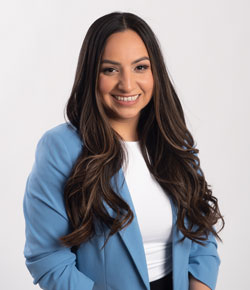
Rocio Hermosillo spent a few years working in a corporate environment when she had a realization about her future.
“I was working there for a while and I had this aha moment where I was like, ‘I don’t want to live like this.’ I saw a different lifestyle,” she said.
She left that job and began working in real estate, eventually co-founding Team ELLLA, Iowa’s first Latina-led real estate team. It was here she found the freedom to be the authentic, understanding leader she knew the people around her needed.
What made you want to open and lead your own business rather than work for an already established realty firm?
I did a lot of corporate, and then I quit and did join a real estate team. I was there for about three years. I learned very quickly, things were going well. But what I was also learning was someone else’s way of doing things, someone else’s values and goals or vision, sometimes doesn’t align with exactly what is true and real for you. I kept finding myself in a lot of businesses that had nothing wrong with them, but they were led by men. From a woman’s perspective, we have so many different hats that we wear culturally. You’re expected to have these social things that you need to do. And it just didn’t work for me. The structure did not allow for me to feel that I could be both, that I could still be a good mom and a great agent. That was my first indication that there could be a different way to grow or build this. I wanted to build something differently that aligned for people that are like me or can relate.
What do you value in leadership and try to pass on to the people that work for you?
It’s authenticity. We’re in a world where everyone is always telling you what to be or do, or what they think success should be and look like. At the end of the day, true leadership is being honest with yourself and going within, ‘Is this really what I want?’ I think that’s something I always ask our agents to do. What’s real with you? I don’t want you to say you have this audacious goal of hitting 100 families, when in reality for you, what’s most important is your family. So you’re really going to do, like, two. That’s OK. Let’s be real and authentic with ourselves.
The other thing about leadership, and that’s something I learned from others, is to always bring someone along. I didn’t get here by myself. I literally stand on the shoulders of giants of leaders here in Des Moines that I got to learn from. Giving it back is always important for me.
How do you see your and your peers’ philosophies around leadership differing from past generations of leaders?
Before, I think it was more about authority and power. Who’s the loudest? There’s nothing wrong with that, it’s just a different style. Today, millennials and Gen Zers want to be a part of something that’s bigger than them. What I hear from some of our agents is that they want a bigger life. They want to see, can I truly be myself here, or do I have to perform and be someone I’m not? I think people are starting to be more attracted to that. When I looked at leaders from the past, it was more of, ‘We need to go from here to here.’ And trust me, I’m still very much like ‘We need to get to here,’ but now we think about connectivity before I’m telling them what to do. It’s about collaboration, more now than ever.
How did you incorporate those values into your leadership team when working with your two co-founders?
I always go back to values. I think deep down, our values don’t change. But also, it’s what are your goals? What’s the life you are trying to build? Who you surround yourself with is key. What I looked at is that I had known these ladies already for years. I had worked with them and seen their work ethic and their hustle and their grind. I got to interact with them and really understand that we all wanted to build the same thing. We wanted a life of freedom, of choices, to do what we want when we want, as much as we want, as often as we want, and with whoever. It’s truly that freedom that we’re trying to build and make an impact while we do it.
What I’ve learned through leadership as well, is that there’s different seasons and that’s OK. There’s seasons of hustle and there’s seasons of stepping back. One of our founders, she’s a mom and she’s basically running it herself, and we’ve had the conversation like, ‘Hey, I can’t lead from the front right now.’ I think having people around you that get it and understand you is key. I think that’s what the younger generation of workers want, that understanding. Before, it was taboo to talk about mental health or all of these things that are going on. As seasons happen, as life happens, priorities shift. And I think it’s understanding that and that it’s OK if someone grows and they decide they want to do something different.
Emily Stork, executive vice president and chief risk officer, Bankers Trust
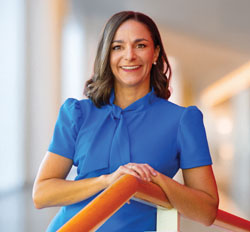
Emily Stork’s journey to her law profession began in an unexpected place. After trying biology and realizing she didn’t want to be a doctor, she majored in vocal performance at Luther College. She realized around her junior year that while she loved music, she didn’t want a performance career. She had enough liberal arts classes under her belt, and decided to try law school.
That worked well for her. She graduated from Drake University Law School and became a practicing attorney in 2007. She worked for a private practice before joining Bankers Trust in 2017. A close mentor guided her to the leadership position she has today.
“My journey to leadership had a lot to do with my manager who was in the role that I’m in now, Gary Buelt,” Stork said. “It’s not something that I think I sought or identified for myself, but he saw that potential in me. So it was really that leading me into that space that was probably the biggest part of the journey.”
Buelt’s belief in her influences how Stork views leadership as a position to guide others to becoming the fullest version of themselves.
How did you build your leadership philosophy when you moved into your current position?
It takes a minute to learn your way. I had a really good example of being a good listener to others and also being able to see the potential in others and help lead them into opportunities as well.
I’d describe myself as a participative leader. I want many voices. I want many team members to participate in our decision-making. I think that starts not at the decision, but in making sure people have the tools they need to perform their work, that they’re empowered to perform the work independently but also supported to perform their work with curiosity. I think that leads to better, more well-rounded decisions and also better embraced decisions because a lot of people are part of that whole process.
How do you see your and your peers’ philosophies around leadership differing from past generations of leaders?
I was lucky to have a leader like Gary, who built this whole enterprise risk program at the bank and was the bank’s first chief risk officer. He was a subject matter expert, so I really got great insight into this space. But really it’s that he saw potential and led me to opportunities that I wasn’t really even seeking out. While it was beneficial to me, it was also an intentional part of his succession planning.
I think the new generation of leaders is more apt to focus on results and maybe less on the journey to get there. So things like hierarchy, job titles are a little less important because we know everybody is capable and wants to be a difference maker.
What do you admire most about your peers’ leadership styles and philosophies?
There are so many that I admire and I think do a nice job. I think it’s the authenticity that I admire the most, but also the willingness to think about things differently. We all stand on the shoulders of someone else, but the ability to look ahead and see how maybe we have to do things differently because the world is changing, and the pace of change right now is as slow as it’s ever going to be in our life.
As a leader, how do you bring that next generation up after you and empower them through the imposter syndrome young people often feel?
It starts with knowing your team members, knowing what their values are and where their skill sets really shine, and then giving them the opportunities that align so they gain some real confidence. Then have a little bit of repetition and feel comfortable in the space and then stretch them. I say that because I moved from what was a lawyer role into a leadership role over areas of business that while I understood, I had never worked in before, and that was a stretch. But I knew that I had the support of my manager and of the leadership at the bank. You help people gain confidence in the space and then give them opportunities that maybe are a little bit outside of what they’ve normally done, but doing it where they feel comfortable to know you’re there if there is a failure.
How do you see the culture of leadership in Des Moines shifting as we move into a new generation of leadership?
There’s a lot of really good things that we retain from our predecessors. I’m really grateful that I think the community engagement sticks. The next generation of leaders is just as committed to giving back to Des Moines or the communities they serve in the same or maybe even new ways. That’s something that really makes Central Iowa beautiful and an enriched environment. The thing that I think maybe we see more of is transparency, whether that’s transparency in decision making or transparency in that whole person concept that we’re bringing to the office. There’s more comfort in talking about everything that’s going on, instead of just the 8 to 5 and the tasks at hand. I think that hopefully will lead to a more committed workforce who really feel supported in the space that they work.
Alyssa Saunders, executive vice president, Anthologic
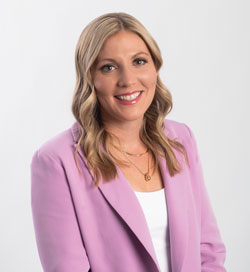
Alyssa Saunders wasn’t exactly sure what she wanted to do straight out of college. So she took a job in the insurance industry and began to explore.
Her journey led her to marketing, eventually joining the Anthologic team at the beginning of the COVID-19 pandemic. The world was operating in unknowns, and she took it as an opportunity to reset.
“I took a leap of faith from being on the carrier side and in-house marketing to the agency side, and the whole world went kind of crazy. But it turned out to be a really good opportunity. Everyone was kind of resetting how they worked, what work-life balance looked like, what it looked like to do their job,” Saunders said.
She found she enjoyed working on the operational and strategy side. She became executive vice president of Anthologic in April, a position in which she’s able to continue strategizing what it looks like for the employees to do their job.
What have you learned about your own philosophy of leadership since starting this position three months ago?
Before this, I led the operations team, so this has really been more of an expansion of that. I’ve learned that everybody is different and there’s no one-size-fits-all approach to how you can work with someone and help them be their best self at work. And I think what I’ve really learned is that leadership is a two-way street. I’ve empowered my team to lead me just as much as I lead them. I’m looking for ways to learn from them and ways that we can find that common ground all the time.
In my role, I have an IT director, a director of finance, a benefits person and all of those things are not my area of expertise, so I have to find a way to balance how I lead someone who I really don’t know that much about their day-to-day job and letting them lead me in those directions. One of my team members has a different philosophy on how they do their job than how I would have approached that, so I had to learn what drove his decision making and how he evaluated things, and in that way, I learned a lot from him on how to make decisions.
How do you encourage an atmosphere of authenticity and collaboration between leaders and employees?
It’s challenging because authenticity can be a double-edged sword. In some ways, it feels like you’re lowering the bar on being a professional. I’m always trying to balance those two things, and I think it really starts with the leader. I set the tone for my team and the people around me. I have to know that I might say this is the bar, but whatever my actions are is really where the bar is. I do a lot of self reflection and recalibrating. You set the tone by really knowing yourself and being clear about what it means to be authentic.
How do you hope to make an impact as a young leader in your business?
I think I can bring a balanced viewpoint. There are some things in the traditional workplace and environment that worked well and were important and in place for a reason. I think sometimes, younger leaders tend to overhaul for the sake of, ‘I need to start fresh.’ My goal is to find what we need to do to be relevant and to embrace the future and balance that with the tradition and fundamentals that work.
How do you see your and your peers’ philosophies around leadership differing from past generations of leaders?
I think my biggest value that I bring into any job or team is accountability. I think in previous generations, there was a mentality of get the job done and then move on to the next. Do whatever it takes to get the job done. Now, you see a push toward not only do you need to do your job, but you need to do it in a way that’s responsible, and you have to be the owner of your work product. It’s always been there, but maybe in a different way where it’s more about the person who brings the work and how they do it. We have more generations in the workplace than there ever have been before, and what they think about work and what work means to them is so vastly different. On the operations side, we’ve learned that belonging means different things to different people, and it can’t be an “everybody do this” environment anymore.
How do you see the culture of leadership in Des Moines shifting as we move into a new generation of leadership?
We’ve seen a lot of big companies in the area have transitions at the C-suite level, and usually following that, there’s some sort of rebrand or statement or they just appear differently. I’m noticing it’s a lot more values and purpose-focused than it traditionally has been. I think the conversations we’re having in Des Moines about business are really more inclusive of what a company desires to be to the community, to the people that work there. It’s smart, because younger generations want to know who they’re working for. On a deeper level, they care about the impact of a company.

Macey Shofroth
Macey Shofroth is the Fearless editor at Business Record. She covers gender, nonprofits and philanthropy, HR and leadership, diversity, equity and inclusion.

